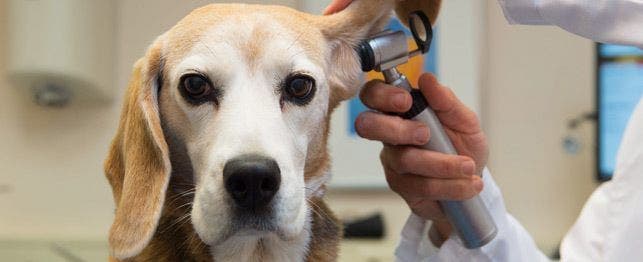
What to Expect at a Dog Checkup
Thinking about skipping the veterinary dog checkup this year? Think again.
It’s a good practice to take your dog to the veterinarian once a year, and skipping the visit could mean you miss out on preemptively spotting a health issue. Skipping an examination can also mean that your dog doesn’t get shots he needs to stay healthy.
An annual dog checkup means a routine examination to make sure everything in your dog’s body is working properly, and that nothing is wrong. Without it, your dog’s overall health could be at risk. The visit to the veterinarian won’t be time consuming or expensive, especially if your dog has insurance.
In recent years, the number of people who have pets has increased, but the amount of those pets getting good veterinary care has decreased over time. Even if you don’t see the point of an annual checkup if your dog is fine, remember that dogs age faster than you. A year for you is around 5-10 for your dog, so while you may think your dog is healthy, there could be an issue that has yet to prominently present itself that your veterinarian could easily find and treat.
Help your dog remain in his healthiest state with an annual checkup. Your veterinarian will perform all kinds of helpful tests to make sure your dog is happy and healthy.
Nobody likes to be surprised at the vet, and if you know what you’re walking into, it might make it easier to make an annual dog checkup a priority. Here’s what you should expect at a dog checkup.
What Happens at a Dog Checkup
Your veterinarian will check your dog’s temperature.
A normal temperature for dogs is around 101 to 102.5 degrees. Your veterinarian will make sure that your dog has a healthy temperature to ensure that there’s nothing else going on in your dog’s body. Dog temperatures are taken rectally, so don’t be alarmed when the veterinarian lifts your dog’s tail.
Your veterinarian will check your dog’s skin and coat.
Your dog’s coat should be shiny and the skin should be clean. Your veterinarian will check to make sure everything is looking the way it should, and if there is anything wrong, your dog’s skin and coat can be clear indicators of a problem.
Your veterinarian will check your dog’s ears.
Checking inside both ears will tell your veterinarian if your dog has an infection or an allergy issue. These types of problems typically start deep in the ear canal, where you won’t be able to see on your own. Your veterinarian will be able to recognize an issue and provide treatment before it gets worse and causes damage.
Your veterinarian will listen to your dog’s heart and lungs.
Listening is key to identifying problems within your dog’s vital organs. Your veterinarian will listen for common issues with the heart’s rhythm or valves. Anything that doesn’t sound right will lead to additional tests to find the problem and any potential treatment. Your veterinarian will also listen for issues with the lungs, but problems with the heart are more common.
Your veterinarian will examine your dog’s abdomen.
Feeling your dog’s abdomen can reveal a lot of problems that you may not have known existed (of course it can always reveal a perfectly healthy dog too). It’s not uncommon for a dog owner to find out that their dog is pregnant at a checkup. Knowing how the inside of your dog is doing is just important as checking up on the outside.
Your veterinarian will check your dog’s eyes.
Checking the eyelid and the eyes is important to make sure your dog isn’t suffering from any infections or complications like cataracts. Having a regular checkup can help have issues detected early so treatment can be started sooner. Your veterinarian will also be able to tell if your dog is suffering from any allergies depending on the state of his eyes.
Your veterinarian will check your dog’s paws and toenails.
During this portion of the exam, your veterinarian will check to make sure that your dog’s toenails aren’t too long, and if they are, they’ll be able to trim them to an acceptable length. Examining your dog’s paws will also be able to show if your dog is having any problems with the pads on his feet.
Your veterinarian will offer any recommendations for better dog health.
Your veterinarian will show you how to give your dog a better life, including tips on diet and/or supplements that will help him live healthier. Whatever your veterinarian finds during a dog checkup will affect what he or she recommends for your dog’s overall health and well being.